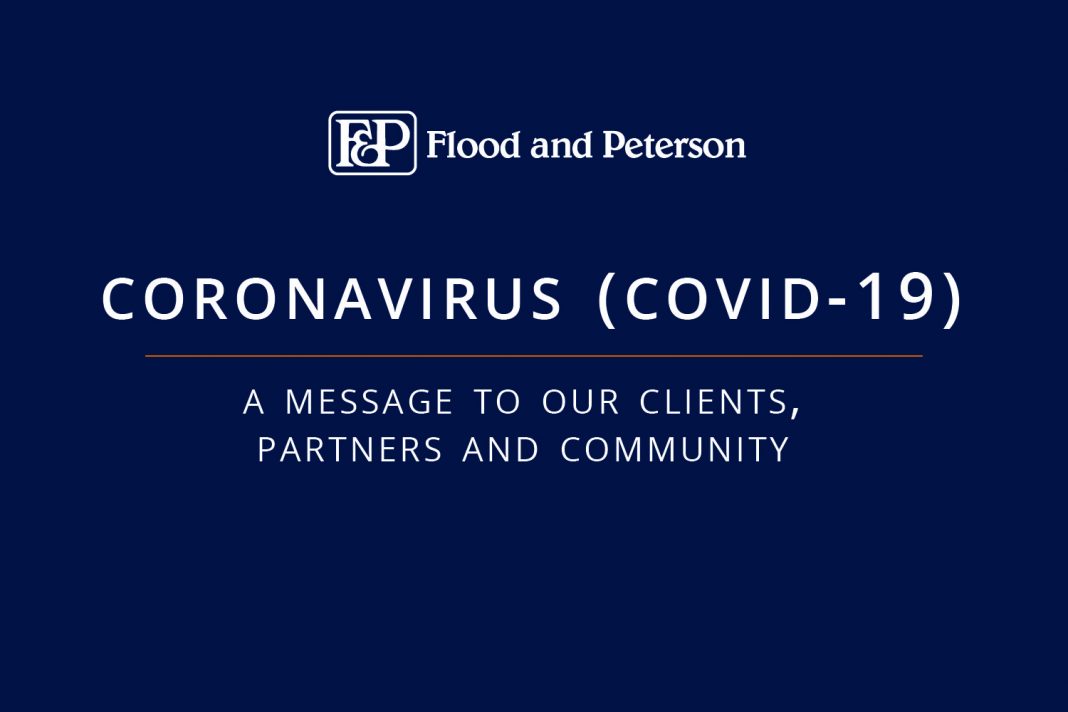At Flood and Peterson we value the health and well-being of our clients, partners and community. It takes precedence above all else, especially at this pivotal moment.
We understand the concern around COVID-19 and are continually monitoring official reports and updates on the situation to keep ourselves and your informed. Below you can find more information on how to optimize the preparedness of your business, find answers to common insurance coverage questions and a list of applicable resources.
As always, please feel free to contact your Risk Advisor or Account Manager with any specific questions.
A message to our clients, partners and community
The Novel Coronavirus (COVID-19) continues to dominate global, national, and local headlines as new cases continue to rise with confirmed cases throughout the world, including the united states. while public health officials are leading the preventative work needed to limit the effects of the infectious disease, it is important for organizations to manage their own risk by planning their response to protect their operations and people.
Preparedness and Risk Mitigation
Effective preparedness strategies should focus on emergency response, business continuity, crisis management, and crisis communication. These strategies should also take into account and address the potential impact and costs to the organization, which can include:
- Loss of workforce due to death and illness.
– How should we engage with public health and government entities? - Increased employee absenteeism and lower productivity due to family care obligations, social distancing, and fear of infection.
– What if we lose critical people, or have staff working from remote locations? - Operational disruptions, including interruptions and delays in transportation networks and supply chains.
– Which products and/or services are of greatest value and how would revenue be affected by a disease outbreak?
– Will our plans work in the event of border closures, travel restrictions, or reduced exports of certain commodities? - Reduced customer demand.
– Will the fear of infection affect our key customer base? - Reputational damage if an organization’s response to an outbreak is seen as ineffective or if its communications with internal and external stakeholders as incomplete or misleading.
– How can we position the organization to respond positively?
– Who should we involve in our response efforts?
Employee well-being is of the utmost importance when developing preparedness strategies. Organizations should monitor guidance and updates from public health agencies, governments, industry groups, and other experts and determine procedures, including notifications to health authorities, employees, and other stakeholders, in the event of a suspected case.
Business should also:
- Review or develop employee health procedures to minimize the potential for transmission or infectious disease to other people, including employees, their families, and customers. This could include
– The need for individuals to be quarantine or isolated
– Additional cleaning protocols
– Travel restrictions - Keep employees informed and educated about outbreaks and relevant health care precautions. Encourage employees to remain home when sick and consider a remote working policy to limit spread of the disease.
Insurance Coverage Questions
In addition to preparedness and risk mitigation strategies, it is important to understand the potential response of an organization’s insurance policies in the event of an actual or perceived infectious disease threat. Each situation and incident are unique and any insurance policy response would be specific to the coverage terms and conditions of that policy. However, there are some guiding principles with certain policies that are important to understand.
One of the most common insurance related questions we receive relates to coverage for business interruption or loss of income if a government authority requires a business to close. In short, coverage for business interruption would not be provided because there is no direct damage to property that led to the ceased operations. In addition, questions arise related to how workers’ compensation will respond to Coronavirus? Two tests must be satisfied before any illness or disease, including Coronavirus, qualifies as occupational and thus compensable under workers’ compensation:
- The illness or disease must be “occupational,” meaning that it arose out of and was in the course and scope of the employment; and
- The illness or disease must arise out of or be caused by conditions “peculiar” to the work.
Course and scope is a function of the activities and can be evaluated by whether the employee was benefiting the employer when exposed to the illness or disease. An illness is “peculiar” when such disease is found almost exclusively to workers in a certain field or there is increased exposure to the illness or disease because of the employee’s working conditions.
It is important to remember that the ultimate interpretations and determinations of compensability is subject to the specific state laws.
While the two insurance coverage questions above seem to be the most common, other incidents could impact other insurance policies that include, General Liability, Environmental, Directors & Officers Liability and Foreign Liability. As previously mentioned, each situation should be evaluated based on the specific terms and conditions included in any policy. Please contact your Risk Advisor or Account Manager with any specific questions.
Resources
Preparing for and mitigating the impact of a pandemic event (or any major disaster) takes a team to prepare and execute an effective plan. We, at Flood and Peterson, are committed to helping our clients effectively manage these risks to successfully meet their organizational goals and objectives.
Flood and Peterson COVID-19 Resource Center.
Here are some additional resources you might find helpful:
